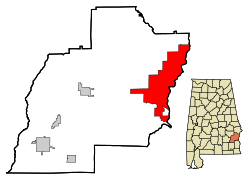Eufaula, Alabama
| Eufaula, Alabama | |
|---|---|
| City | |

The MacMonnies Fountain in downtown Eufaula.
|
|
 Location in Barbour County, Alabama |
|
| Coordinates: 31°53′21″N 85°9′13″W / 31.88917°N 85.15361°W | |
| Country | United States |
| State | Alabama |
| County | Barbour |
| Government | |
| • Mayor | Jack Tibbs |
| Area | |
| • Total | 73.5 sq mi (190.3 km2) |
| • Land | 59.4 sq mi (153.9 km2) |
| • Water | 14.1 sq mi (36.4 km2) |
| Elevation | 262 ft (80 m) |
| Population (2010) | |
| • Total | 13,137 |
| • Density | 189.2/sq mi (73.1/km2) |
| Time zone | Central (CST) (UTC-6) |
| • Summer (DST) | CDT (UTC-5) |
| ZIP code | 36027, 36072 |
| Area code(s) | 334 |
| FIPS code | 01-24568 |
| GNIS feature ID | 0118051 |
| Website | http://www.eufaulaalabama.com/ |
Eufaula is the largest city in Barbour County, Alabama, United States. As of the 2010 census the city's population was 13,137.
The site along the Chattahoochee River that is now modern-day Eufaula was occupied by three Creek tribes, including the Eufaulas. By the 1820s the land was part of the Creek Indian Territory and supposedly off-limits to white settlement. By 1827 enough illegal white settlement had occurred that the Creeks appealed to the federal government for protection of their property rights. In July of that year, federal troops were sent to the Eufaula area to remove the settlers by force of arms, a conflict known as the "Intruders War".
The Creeks signed the Treaty of Washington in 1826, ceding most of their land in Georgia and eastern Alabama to the United States, but it was not fully effective in practice until the late 1820s. The 1832 Treaty of Cusseta, by which the Creeks ceded all land east of the Mississippi River to the United States, allowed white settlers to legally buy land from the Creek. However, the treaty's terms did not require any natives to relocate. By 1835 the land on which the town was built had been mostly purchased by white settlers, and had a store, owned in part by William Irwin, after whom the new settlement was named "Irwinton".
By the mid 1830s downtown Irwinton was platted out and development was well underway. Much of its historic character has been preserved and is now known as the Seth Lore and Irwinton Historic District. In 1842 or 1843 Irwinton was renamed "Eufaula", possibly to end postal confusion ensuing from its proximity to Irwinton, Georgia. The town was officially incorporated under that name in 1857.
In 1850 secessionists in the town formed a vigilante committee which terrorized any white people who had abolitionist sympathies. Thus captain Elisha Bett was driven from the town and only returned after he had signed a written agreement not to express his views again.
...
Wikipedia
